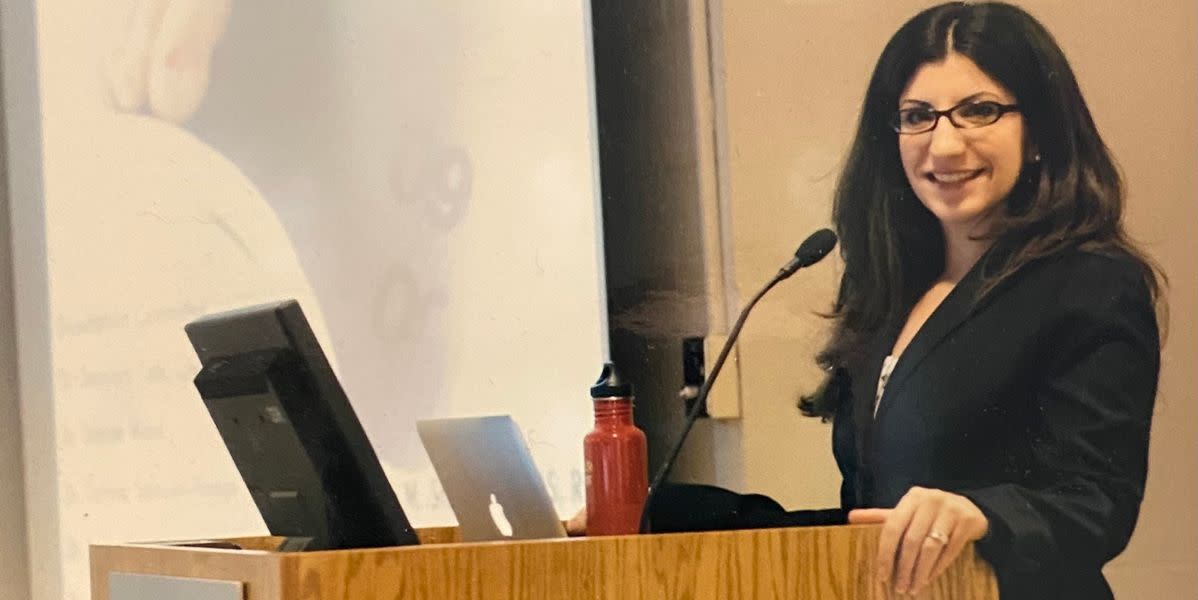
Presenting my dissertation 10 yrs back. If you look carefully, the monitor displays the title of my speak, which was all about obesity and day by day weighing. (Photo: Picture Courtesy of Dori Steinberg)
Written content notice: I use the phrase “obesity” in the title and all over the piece only for the purpose of describing my job aim right before I understood my research was resulting in hurt. This term may seem like neutral health care terminology, but for numerous, it is stigmatizing.
I was an “obesity” researcher for approximately two many years, and in that time, I assisted design and examination various excess weight-loss applications. Like other vacationers alongside my vocation path, I had good intentions from the get started. I truly thought I was supporting persons by supporting them to drop fat. But I was wrong.
I struggled with my very own body weight and human body impression at any time because I was a young kid. Increasing up just outside New York Town in the ’80s and ’90s, a time whendiet plan tradition was alive and thriving, I designed main beliefs that something was erroneous with my human body and that becoming unwanted fat was some thing to stay away from — at all prices.
In my early teenagers, I attended bodyweight-decline camps with the hope that if I could just shrink my entire body, points would be much better. I misplaced fat, but it speedily returned. I blamed myself, wondering that if I genuinely needed to drop body weight, I would have to do improved. By the time I was 15, I resolved to develop into a dietitian.
I believed additional know-how about diet was the crucial to controlling my have body weight and that I could assistance other individuals together the way. This option ultimately morphed into a career in research, where by I concentrated on investigating how to “solve” long-term disorder with pounds decline. But even in my tightly managed reports, with ample methods and day by day support, most of the contributors reached negligible body weight decline and acquired the pounds again when the study finished.
Immediately after lots of attempts to layout an helpful bodyweight-loss software, I recognized that the info from the scientific studies I worked on never succeeded in showing that bodyweight could be modified long-term. And it wasn’t just in my very own investigation — the broader scientific literature confirmed equivalent final results. In 1 prominent national review, only10-20% of study participantstaken care of pounds reduction immediately after 1 12 months, with even decreased prices several years later.
I also understood that figuring out excess weight as the primary indicator of health was problematic. It is not possible to inform someone’s well being just by searching at their system sizing, and becoming thinner does not necessarily equate to currently being healthier. The reality is that much of our pounds and shape isestablished by genetics — just like peak. The misguided perception that we can all be in small bodies is not only mistaken, it’s damaging and discriminatory.
Just after a lot internal reflection, I understood I experienced an taking in problem, stemming all the way back again to my childhood. I also recognized that my ingesting disorder was what drove quite a few of my occupation choices and beliefs about excess weight and wellbeing.

The creator at age 11 in 1991. (Photo: Image Courtesy of Dori Steinberg)
Immediately after receiving cure in my late 30s, I saw my career researching “obesity” in a new gentle: My do the job was perpetuating harmful methods and stereotypes, and I could not be a aspect of that any longer. I switched my focus to researching feeding on conditions, how they present them selves and affect assorted people, and what we can do to treat them far more effectively.
Together this journey, I realized a number of essential factors I feel are important for businesses, medical professionals, researchers and the basic populace to fully grasp.
There are no “good foods” or “bad foods.”
The fantasy that some meals (e.g., cookies) are “bad” and are to be avoided in favor of “good” food items (e.g., fruits and veggies) is a person of the destructive beliefs that led to my taking in ailment in the 1st place. Dieting or limiting any meals is normally agateway to disordered ingesting. People will need all types of foods to stay and thrive – even the sugars and fat we have been falsely taught to often turn down.
In addition, this black-and-white thinking ignores the point that not all people can obtain the so-known as “good” food items. Social determinants this sort of as poverty and food stuff insecurity make it tough for many to entry or pay for refreshing fruit and vegetables, discover time to prepare “balanced” meals a few times a working day, or even know when their upcoming food will be.Food stuff insecurity is extremely correlated with feeding on problems, and the message that some foods are to be averted to better your wellbeing only perpetuates that danger.
Weight is not intrinsically tied to wellbeing.
The overall health treatment field has set too significant an emphasis on the connection involving weight and well being. Instead than investigating other aspects for circumstances like chronic soreness or diabetes, several clinicians will just about instinctively turn initial to fat and advise that fat decline is the reply. This form of excess weight bias haselevated about the past many decades.
Fat bias disproportionately harms persons in substantial bodies, who generally stay clear of seeking wellness care for the reason that of the stigma they encounter. Clinicians have to prioritize getting rid of other, additional severe, root causes of signs or symptoms 1st, rather of centering excess weight as the main issue — no subject who they’re dealing with. They also want to hear to their individuals and have faith in that they know their bodies best as an alternative of refusing to examine an disease or agony dependent on the patient’s entire body sizing.
It is by no means much too late to unlearn destructive thoughts.
I held my beliefs about weight, food items and wellbeing for many years — both equally personally and professionally. It is uncomplicated to imagine that after you keep a core concept for so very long, and even build a vocation out of it, it can be difficult to transform your perspective.
What assisted me unlearn these beliefs was the recognition that I was encouraging unsafe behaviors that frequently demonstrate up in people today with having disorders. The only variation is that we believe these behaviors are valuable for people in huge bodies and harmful for those people in skinny bodies. The reality is, these behaviors are hazardous for absolutely everyone.
My journey has not been an simple one particular, but I have gained so significantly as a outcome. I gained excess weight, as my system wanted far more nourishment. I received freedom from the oppressive beliefs that my worthy of is tied to my body weight. I gained a new passion for looking into having disorders and making use of what I understand to enable others.
I also gained much better mental overall health, better connection with my household and pals, and a firm perception that we need to dismantle our culture’s destructive thoughts about excess weight and overall health so our future technology of children can mature up believing their bodies really don’t will need to be modified in get for them to have value.
Dr. Dori Steinberg is a researcher, registered dietitian and advocate for taking in ailment prevention. She is now VP of Investigate and Plan at Equip Wellness.
Do you have a compelling particular tale you’d like to see posted on HuffPost? Discover out what we’re on the lookout for here and mail us a pitch
This post originally appeared on HuffPost and has been current.





More Stories
Join the Online Education Wave: Virtual Preschool Teacher Jobs Open!
Truth For Teachers – Why you need a “to-don’t” list
SkillsUSA Devils Lake brings home 16 medals